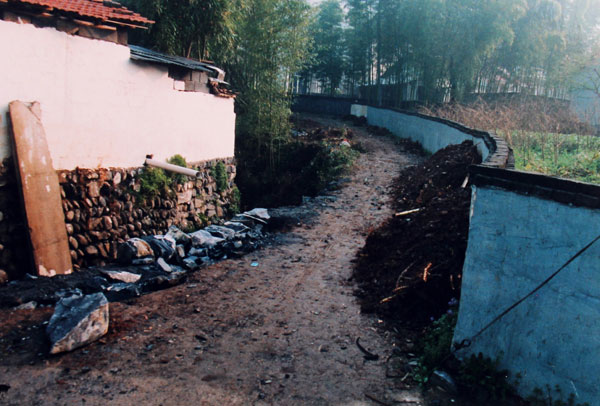Anji cleans up by cleaning up
By Yan Yiqi (China Daily) Updated: 2015-05-28 07:49
 |
| Before 2003, the environment in Yucun village in Anji was ruined by quarries and cement factories. Provided to China Daily |
Decline and rise
In 2003, the local authorities decided to develop the county via an ecological growth model, not an economic one.
Despite the recent success, Shan Jinyan, the Party chief of Anji, said maintaining the development model has been tough.
"Ten years ago, if anyone had asked me if I was confident about taking this path, my answer would have been 'no', because we had been experiencing a very difficult time, especially in terms of economic development."
To give priority to ecological development, the authorities closed 33 quarries, cement factories, and paper mills, industries that generated about one-third of the county's annual tax revenue.
After the closures, Anji's economic performance plummetted, with Huzhou occupying the bottom rung on the county's wealth ladder for six consecutive years.
Meanwhile, in Yucun, annual revenue declined to 200,000 yuan in 2004 from 3 million yuan the previous year.
Both Pan and Hu said they both harbored doubts about the decision to close the pillar industries, and for Pan those feelings were magnified when disgruntled villagers called at his home to express their dissatisfaction.
"The only thing I could do was to promise them that a better environment would mean they would earn much more money eventually," he said.
The entire county was hit by the economic downturn, and for Shan the hardest times came in 2007 and 2008, when he had to borrow money from Huzhou to pay the salaries of local civil servants.
"However, our recent success proves that the pain we encountered during those years was worth it," he said.
To encourage all level of governments to stick to the ecological development path, Anji provides different focuses for its townships, and unlike places where government efficiency is evaluated by a unified set of economic growth standards, the county uses specific standards to measure the performances of different towns with different focuses.
In Anji, six townships are exempt from evaluation by economic standards such as annual revenue and inbound investment. "Instead, we evaluate them via environmental criteria such as water and air quality," Shan said, adding that even in townships focused on industrial development, there is no room for investments that could damage the environment.
"In 2005, we turned down an 8 billion yuan papermaking project because it did not meet our environmental evaluation standards," he said.
Incomes soar
Zhang Heying, a resident of Shanchuan township, said she only recently realized that a good environment can be a money spinner.
The former textile factory worker is now a cook at a guesthouse in her hometown. In addition to her wages, she sells homegrown fruit and vegetables to tourists, and her annual income has now reached 50,000 yuan, far more than she could earn at her former job in the factory.
"I can see that Anji's clean environment is attracting an increasing number of tourists from the big cities, so I plan to open my own guesthouse this year," she said.
Ecological tourism is now an important industry in Anji, attracting more than 12 million tourists last year and generating revenue of 12.75 billion yuan.
Yucun, once heavily polluted, is now a tourism hot spot, and by the end of last year, the village had three tourist attractions, while 14 guesthouses provided a total of 410 beds. The village had revenue of 188 million yuan, while per capita income had risen to 27,677 yuan, a far cry from the mere 7,576 yuan recorded in 2004, mainly thanks to the new pillar industries: agricultural, bamboo, and culture.
Shan said that in addition to the sustainable growth brought by the ecological development model, the people of Anji have become increasingly aware of the value of maintaining and protecting their clean, livable environment.
"No one in Anji would sit back if they saw pollution taking place because they now realize that they can rely on the improved environment," he said. "I think this raised awareness is much more important than economic development."
Contact the writer at yanyiqi@chinadaily.com.cn

- Govt encourages people to work 4.5 days a week
- Action to be taken as HIV cases among students rise
- Debate grows over reproductive rights
- Country's first bishop ordained in 3 years
- China builds Tibetan Buddhism academy in Chengdu
- Authorities require reporting of HIV infections at schools
- Typhoon Soudelor kills 14 in East China
- Police crack down on overseas gambling site
- Debate over death penalty for child traffickers goes on
- Beijing to tighten mail security for war anniversary







